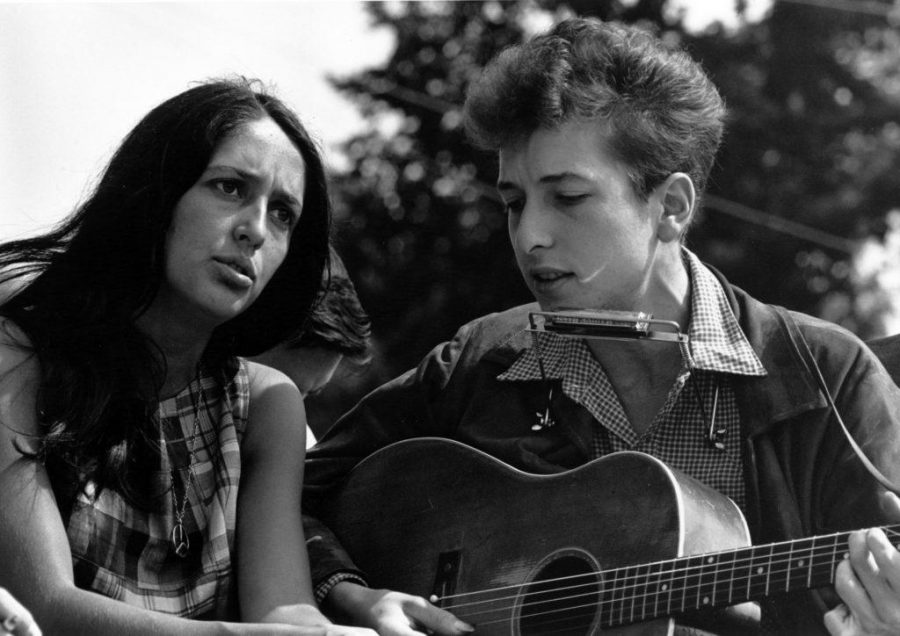As a nation, we recently celebrated a day dedicated to one of the most revered activists for social change of our time, Rev. Martin Luther King Jr. MLK inspired the nation to band together to end the war on civil rights, and to gain equality for all. However, he couldn’t have done it alone. One of the key parts of marches, protests, sit-ins and other events were the musical performers that supported the cause. Nothing quite inspires change like music, and no one quite got that energy flowing at events like Joan Baez.
Baez devoted her entire singing career and life to the support of the civil rights movement, the war on poverty, the resurgence of the women’s movement, and in fervent protest of the Vietnam War. Even though she is a talented songwriter, Baez tended to pull folk classics and recent hits, in order to connect with the masses and deliver her message in a powerful manner.
One example of such an interpretation was her cover of Bob Dylan’s folk standard “Blowin’ in the Wind.” Baez uses this song for an emotional rhetorical challenge of listeners. In the lyrics “How many roads must a man walk down, before you call him a man?” she asks listeners to consider just how much we will force others to go through before we take a stand. “Yes, and how many times must a man look up before he sees the sky? How long will they wait before there is a glimmer of light?” This song applies to all of Baez’s protest values.
Another beloved cover is her rendition of Pete Seeger’s “We Shall Overcome,” which became a theme for the civil rights movement. It is heard in countless documentaries and compilations showing the marches and struggles of black America through the rocky landscape of the 1960s. “We Shall Overcome” delivered hope, strength, and evidence of support to protestors, and served a powerful message to opponents of the MLK movement.
Baez also covered songs in support of the pushes to end poverty in our country, and against the mistreatment of factory workers. She and Mimi Fareña sang “Bread and Roses,” most popularly recorded by John Denver, at many a rally for wage equality. Based on the statement “a worker must have bread, but she must have roses too,” the song shows the necessity of a decent wage and conditions for factory workers, especially females. One of my personal favorite feminist mantras comes from this song: “The rising of women means the rising of us all.” Baez was all about equality and used songs like “Bread and Roses” to show the benefits of workplace equality for everyone, not just for women. For “as we go marching… we battle too, for men.”
Baez was not about anger, but about peace. She longed for the end of conflict whether mistreatment of racial groups or full-fledged warfare. Those desperate feelings come through powerfully in her performance of “Oh Freedom,” a post-Civil War freedom song for African-American citizens. The lyrics read:
“Oh freedom, oh freedom,
Oh freedom over me,
And before I’ll be a slave,
I’ll be buried in my grave,
And go home to my Lord
And be free.
No more weeping
No more shooting
There’ll be singing”
The lyrics are strong in and of themselves, but Baez’s delivery shows the true appeal of a world at peace. She displays so much conviction in her belief that the human race can naturally come together, and faith that the conflicts of the world will one day resolve.
However, Baez also recognized the everyday things that we each must do to help these wars, abroad and here at home, finally come to an end. One message she gives to fans and other activists is to see everyone equally. To give this advice, she uses Phil Och’s folk tune “There But For Fortune.” You can give her any destitute man, any violent man, any drunk man, and she will show you “a young man with so many reasons for why.” Through this song, she shows each of us how lucky we are to be in the position we hold. She teaches us not to judge others because we don’t know anybody’s story. It is an artfully mastered version of that cliché quote: “Everyone you know is fighting a hard battle.”
Baez wishes for all members of the human race to be kind and, as her setlist choices show us, eliminating judgment, conflict and exploitation, is the first step to achieving her dream.
m.hulse@dailyutahchronicle.com
@megshulse


